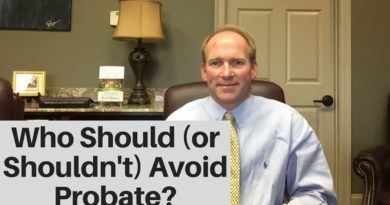Are Assets in a Living Trust Protected From Creditors?
Some people are under the impression that you lose control of assets that you convey into a trust. The purpose of using the trust is to get assets out of your name for some reason, right?
This is a misconception that is based on a partial truth. Absolutely, people do use trusts to transfer assets out of their names because it serves a purpose. These are irrevocable trusts. There is another option called the revocable living trust.
Living Trust Benefits
A revocable living trust will not protect assets from creditors while you are living. This is because you don’t lose access to the assets. This can actually be a good thing because of the other benefits.
You still have complete control of the resources, and you will act as the trustee. In the trust declaration, you set the terms of the distributions, and you name beneficiaries along with the successor trustee.
After your passing, the successor trustee will manage the trust and follow your instructions with regard to asset distributions. The administration process would not be subject to the legal process of probate, which is time-consuming, public, and expensive. This is just one of the benefits.
Another benefit is that you do not have to allow lump sum distributions of inheritances. If you want to include safeguards and maximize the earning power of the trust, you can instruct the trustee to provide limited incremental distributions.
The trust would become irrevocable after you pass away, and the beneficiaries would not have direct access to the principal. At that point, the principal would be protected from the beneficiaries’ creditors. This may be why some folks think that a living trust will protect assets.
Self-Settled Asset Protection Trust
It is possible to use a self-settled asset protection trust to protect assets from future creditors. They are not recognized in Oklahoma, but you could potentially establish this type of trust in a different state.
Irrevocable Trusts
A very common reason to use an irrevocable trust is to transfer assets out of your name so you can qualify for Medicaid to pay for long-term care. If you do this, you no longer have access to the principal. You may, however, accept distributions of the trust’s earnings.
There is a five-year look back period. This requires you to fund the trust at least five years before you apply for Medicaid. Since you can accept distributions of the earnings while you are living independently, you can be comfortable financially while you are waiting out the five years.
People also use irrevocable trusts to leave inheritances to loved ones with disabilities. Many people with special needs rely on Medicaid as a source of health insurance. They also receive Supplemental Security Income (SSI).
A windfall of money could cause a loss of eligibility. To avoid this, you can fund a supplemental needs trust. The trustee that you name would be able to use assets in the trust to improve the beneficiary’s quality of life in many ways.
Because of the way the trust is constructed, its existence would not impact eligibility for need-based government benefits. After the death of the first beneficiary, a successor that you name in the trust declaration would inherit the remainder.
The federal estate tax carries a 40 percent rate, but it is only a factor for high-net-worth individuals. People that are in this financial stratosphere use different types of irrevocable trusts to gain estate tax efficiency.
Attend a Free Webinar!
We make an effort to provide educational opportunities through our webinar series. You can get a lot of information if you attend one of these FREE sessions. So this is an opportunity that you should not pass up.
The dates are posted on our webinar schedule page, and you can follow the simple instructions to register if you would like to join us.
Ready to Take Action?
If you have decided that you are ready to work with an Oklahoma City estate planning lawyer to put a plan in place, we are here to help. Contact us at 405-843-6100 or send us a message today to set up a consultation appointment.
After helping his own family deal with a lengthy probate and the IRS following his father’s untimely death in a farm accident, Larry Parman made a decision to help families create effective estate plans designed to reduce taxes, minimize legal interference with the transfer of assets to one’s heirs, and protect his clients’ assets from predators and creditors.
Latest posts by Larry Parman, Attorney at Law (see all)
Story originally seen here






